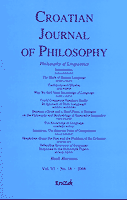Between a Rock and a Hard Place: A Dialogue on the Philosophy and Methodology of Generative Linguistics
Between a Rock and a Hard Place: A Dialogue on the Philosophy and Methodology of Generative Linguistics
Author(s): John CollinsSubject(s): Philosophy
Published by: KruZak
Summary/Abstract: My contribution takes up a set of methodological and philosophical issues in linguistics that have recently occupied the work of Devitt and Rey. Devitt construes the theories of generative linguistics as being about an external linguistic reality of utterances, inscriptions, etc.; that is, Devitt rejects the ‘psychologistic’ construal of linguistics. On Rey’s conception, linguistics concerns the mental contents of speaker/hearers; there are no external linguistic items at all. I reject both views. Against Devitt, I argue that the philosophical issues in linguistics should be framed in terms of the theories themselves, not pre-theoretical conceptions from either philosophy or commonsense as to what linguistics is about or what a language is. In this light, I suggest that Devitt’s key arguments (concerning parameter setting, psychological reality, and the role of intuitions) do not make sense of current linguistic inquiry and so do not offer an adequate philosophical basis of that work. To this extent, I agree with Rey. Our differences emerge over the putative role of content in linguistic inquiry and how the concept of computation ought to be understood. Following the lead of Chomsky’s recent philosophical remarks, I argue that a theory of the language faculty should be understood as an abstract specification of the function that pairs ‘sound’ with ‘meaning’ rather than as a specification of the content the mind represents. But doesn’t ‘computation’ presuppose ‘representation’? I argue for a negative answer, at least if ‘representation’ is read intentionally. A ‘representation’ can be construed as brain structure that, at the present stage of inquiry, can only be picked out via the abstract concepts of linguistic theory. We are entitled to posit such structures insofar as they earn their explanatory keep over the output of the faculty. The linguistic function is a way of setting the boundary conditions on what the brain must be doing such that humans get to be competent speaker/hearers, although we do not therefore take the function to be a story of the causal spring of linguistic performance.
Journal: Croatian Journal of Philosophy
- Issue Year: VI/2006
- Issue No: 18
- Page Range: 469-503
- Page Count: 35
- Language: English
- Content File-PDF

